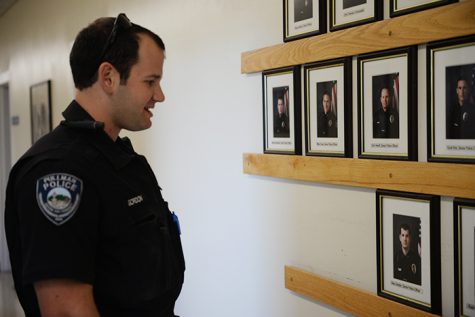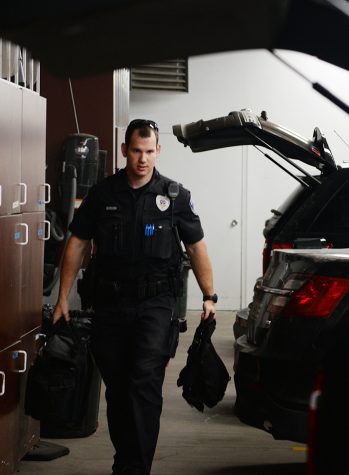‘He knows the hill’
New officer takes on College Hill beat, meant to improve student-police interactions
Cody Cottier | The Daily Evergreen
Alex Gordon, the new College Hill beat officer for the Pullman Police Department, will patrol Greek Row on foot once the semester begins. He will focus more on relationships and education than on strict enforcement.
July 19, 2017
The first parent inquiry at Sunday’s Alive! session comes from a mother who says her daughter is considering going Greek and asks about the atmosphere of that community at WSU. “You hear a lot about how wild it gets,” she says.
The second question, to a panel of representatives from university and local organizations, is more direct.
“I got one for the officers,” says a gruff man in the middle of the auditorium. “How often do you visit Greek Row?”
A broad man with a youthful face steps forward to answer.
“That’s my primary responsibility,” says Alex Gordon, the new College Hill beat officer for the Pullman Police Department. “I’ll be up there pretty much every day at work.”
To be precise, Gordon will patrol the area, mostly on foot, from about 8 p.m. to 4 a.m., Thursday through Saturday. He’ll check on parties and talk to people, respond to calls for fights or alcohol violations, and help with miscellaneous problems.
Each Wednesday, he will meet with university officials to review any incidents involving students, and throughout the year he will give safety presentations to many of WSU’s 43 fraternities and sororities.
His position, established after the riots of the late 1990s, is a liaison between police and the student population. The details are left to the officer’s judgement, but essentially they focus more on education and building rapport with students, and less on strict enforcement.
Because the majority of Pullman PD’s calls come from College Hill, all officers are familiar with the area. But Gordon often served as backup for Shane Emerson, the previous beat officer of four years.
“He knows the hill,” Emerson says. “He knows it well.”
‘Those are my people’
Gordon makes his first round of Greek Row early Sunday morning. Compared to the last two summers, he says, “this year’s just garbage.” He may only get a couple calls a day until students return, when he’ll begin working his beat.
For now, the area is dead except for small rodents zipping across the street here and there.
“Watch out, squirrel,” he says in a high voice, slowing to let the animal scamper away. “They’re everywhere. Must get up early.”
Gordon, 29, is one of the newer Pullman officers. He still resembles his portrait hanging in the hall at the police station, taken when he joined the department at 22. His once-full widow’s peak has receded at the edges, but his face remains young.

Gordon looks at his portrait (bottom left) in the Pullman police station, taken when he joined the department in 2010.
“It kinda sucks that I’m balding now,” he says, “but it was helpful when I showed up and I was 25 and I could be like, ‘I was here five years ago, I was doing the same thing.’ ”
He graduated from WSU in 2009. Though he never joined a fraternity, he spent plenty of time on Greek Row and at the bars. Shared experiences help him to empathize with and relate to the people he polices.
He has worked graveyard shifts since he joined Pullman PD in 2010. Even though he has dealt with many College Hill partiers as an officer in the past seven years, he also maintains a different perspective.
“Those are my people,” he says. “That’s what I was doing when I was a student.”
But the permanent community members are now his people, too. He lives with his wife and 10-month-old son on Sunnyside Hill.
There are obvious differences in expectation between students and the families in Pullman. On College Hill, parties are acceptable and ordinary, but Gordon notes that his neighbors would look at him funny if he and his friends started playing beer pong in a pool in his front yard.
His work is a balance between the needs of different Pullman stakeholders. He says people often forget that officers are caring citizens, and cites this as the reason they work to protect and better their communities. For Gordon, this applies to both the city and WSU.
“I’m alumni here, I don’t want this to be a crappy school,” he says. “Hopefully, my kid’s gonna be a Coug here, and I hope that this is still a good place to be.”
At his discretion
The first call of the day comes over the scanner around 8:30 a.m. A white sedan is driving erratically down Davis Way, headed toward town. Gordon pulls up to the end of State Street and waits.
“Should be riiiight around the corner,” he says, peering up the road. A moment later, “oh, there it is.”
The engine roars as he darts after the car. It crosses into the wrong lane, evidence of the offense. He flashes his lights, pulls over and talks to the driver. A moment later he returns to the squad car.
“So what do you think, should I write ’em a ticket?” he jokes as he processes the woman’s paperwork. “I already decided.”
No ticket. He recognizes it’s likely the woman is simply a bad driver, and a fine would do nothing to help her improve, which he says is the real purpose. What she needed more was directions to her daughter’s cheerleading tournament.
Similarly, sometimes punishment is not the best solution for unruly college students, Gordon says.
His predecessor agrees. Sometimes, it is better to talk to the “knuckleheads,” without telling them they are “in violation of RCW

Gordon loads a squad car for his patrol shift on Sunday.
blah blah blah.”
“We don’t need someone up there who’s just arresting every kid they meet and not being able to talk to them like a person,” Emerson says, adding that Gordon is good at “talking regular” to people.
Emerson employed this style to great effect. He got to know hundreds of students, including a handful he would feel comfortable having over for dinner. The Alumni Association made him an honorary alumnus.
Dakota Renz, the Interfraternity Council president, said Emerson was influential because of the connections he made and his efforts to educate and minimize risk. He said though Gordon has big shoes to fill, he also has the community’s full support.
“We hope that officer Gordon will continue some of these same practices,” Renz said, “while bringing a new breath of community leadership and practices with him.”
Though Gordon will have his own approach and will not be a carbon copy of Emerson, they share some beliefs. Standard law enforcement is necessary, Gordon says, but over the years he has realized the need for different kinds of policing.
“I always thought I was helping the community by arresting people,” he says. “But now my job is to see what the community actually wants, and where we can help them outside of just making sure the bad guys aren’t out there.”
The public image
Gordon has spent the summer representing Pullman police to parents, and soon he will have to do so among their children. Pullman Police Chief Gary Jenkins says Gordon will work without much supervision and must be able to make good decisions on his own.
The College Hill officer is the most prominent position in the department, and therefore the one with the greatest impact on public perception.
“If I look like an idiot, the whole police department looks like an idiot,” Gordon says. “That’s not what I’m gunning for.”
Jenkins is not worried about the department’s image. Gordon received the Officer of the Year award in 2016, for which his fellow officers nominated him. The description with the award paints him as assertive but respectful, physically and mentally fit, and proactive in pursuing community safety through investigations into drug and DUI cases.
“He’s got a really good head on his shoulders,” Jenkins says, “a lot of common sense.”
They have had to remove people from the position in the past, Jenkins says. Even talented officers may not have the demeanor for the job, so not all have lasted the four years that an officer may continue to apply.
Emerson says one common problem is the officer tries to work the beat like they would a regular patrol position. They are too professional and intimidating, when they should worry more about helping students stay safe and improving their interactions with police.
“We want the beat officer to be someone they can go to for help,” he says. “Not someone they’re scared of seeing out on the street.”
Gordon is not sure how long he will stay on the job, but he believes in its importance. Especially in today’s climate, he says, police need an ambassador to their community, someone to teach civilians how to interact with officers and help them understand police operations.
“Now more than ever,” he says, “we need communication from law enforcement about what it is we do and why it is we do it.”









